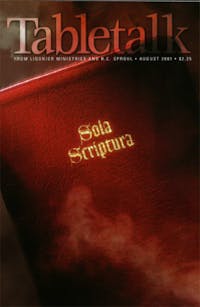
Request your free, three-month trial to Tabletalk magazine. You’ll receive the print issue monthly and gain immediate digital access to decades of archives. This trial is risk-free. No credit card required.
Try Tabletalk NowAlready receive Tabletalk magazine every month?
Verify your email address to gain unlimited access.
In the contemporary debate on the authority of Scripture, the only real concern I have with words like inerrant or infallible is that they are not strong enough. The doctrine of sola Scriptura has two components. The first is that Scripture is the only infallible authority we have. The second is that Scripture is the only ultimate spiritual authority we have. Our twentieth-century Scripture controversies have swirled mainly around the first issue. However, our time would have been better spent on the second, for if the question of ultimacy (and the resultant authority) is not settled properly, any infallibility we affirm will not help us much.
It is the difference between a student who gets a 100 percent score on a test and the teacher’s template for correcting the test. The former happens to be inerrant; the latter (as far as the analogy goes) is inerrant by definition, in principle. Similarly, the Bible meets no standard; it is the standard. Defenders of the Word too often act as if the Bible is an exceptionally bright student, always acing every test we might devise for it.
Modernity (and post-modernity) love to assume a humanistic standard and then assert that the Bible has failed to meet the (“self-evident” and hence not argued-for) standard. Then, for some reason, conservative sons of modernity accept the standard in principle and undertake herculean efforts to show that the Bible does in fact meet the standard. This is why we are treated to the spectacle of professing believers trying to make the Bible successfully meet the standards of modern science, the non-standards of a deconstructed postmodernity, the demands of alternative medicine, the requirements of traditional medicine, or whatever.
This is a subtle form of what C.S. Lewis called “Christianity and.…” The standard of the Word is tied to other alien standards, and what they are does not much matter: pacifism, vegetarianism, science, whatever. But Christianity and whatever always make for thin soup.
In the meantime, the church, Christian colleges, and organizations seek to protect themselves by committing their institutions to confessional statements that affirm the Bible’s inerrancy. So they should, but the waters are deeper than this. Of course the Bible does not contain errors. But neither does my claim that triangles have three sides. What is the difference between the Bible’s inerrancy and my occasional bursts of it? The difference is the other essential component of sola Scriptura—ultimacy.
If we hold to the “bright student” view of inerrancy, we have accepted the idea that an error is a possibility. It is a point that can be discussed. Perhaps we should consider it sometime, in an appropriate academic setting. This assumption of the possibility of error (although actual error is not admitted) is what sets the stage for the next development. This is where we grade the paper just like we used to—writing 100 percent at the top for the time being—but starting to take issue with this answer or that one. This is how dishonest scholars have been able to use the word infallible to mean something like “fallible.” I have heard of one fundamentalist school where inerrancy was affirmed in the same breath as a statement that the Bible contained teaching that was false. Just because we wrote 100 percent at the top of the paper did not mean that we accepted all the answers.
The Scriptures tell us that the Word of God is perfect. That Word is the touchstone; all other aspiring doctrines, teachings, claims, or truths are to be held up to it and evaluated in terms of it. This brings us face to face with something from which the modern mind recoils, even many conservatives who subscribe to “inerrancy”—the idea of ultimate authority, final authority.
The Bible is not a grab bag of infallible truths, thoughtfully provided by God so that we could have an axiomatic starting point for our subsequently autonomous reasoning. The Scriptures are authoritative. We are men, with our breath in our nostrils. We are creatures with little pointy heads. Further, to complicate matters, we are sinful creatures. We must be under a complete authority, a full authority, an exhaustive authority. And we must learn to submit to this authority of the living God (with a little more cheerfulness than we have demonstrated up to this point).
The charge, of course, will be that we have embraced obscurantism. We are opposed, they’ll say, to science, to health, or, worse yet, to good food, wholesome air, and bright sunshine. But we should remain content, whether the slander sticks or not. As creatures, we cannot function without an ultimate court of appeal. This is true of every man, believing or unbelieving, and the only choice we have is whether or not that ultimate court will be the Scriptures.
But surely it should be considered odd for Christians to deny the ultimate place to what God has said.
